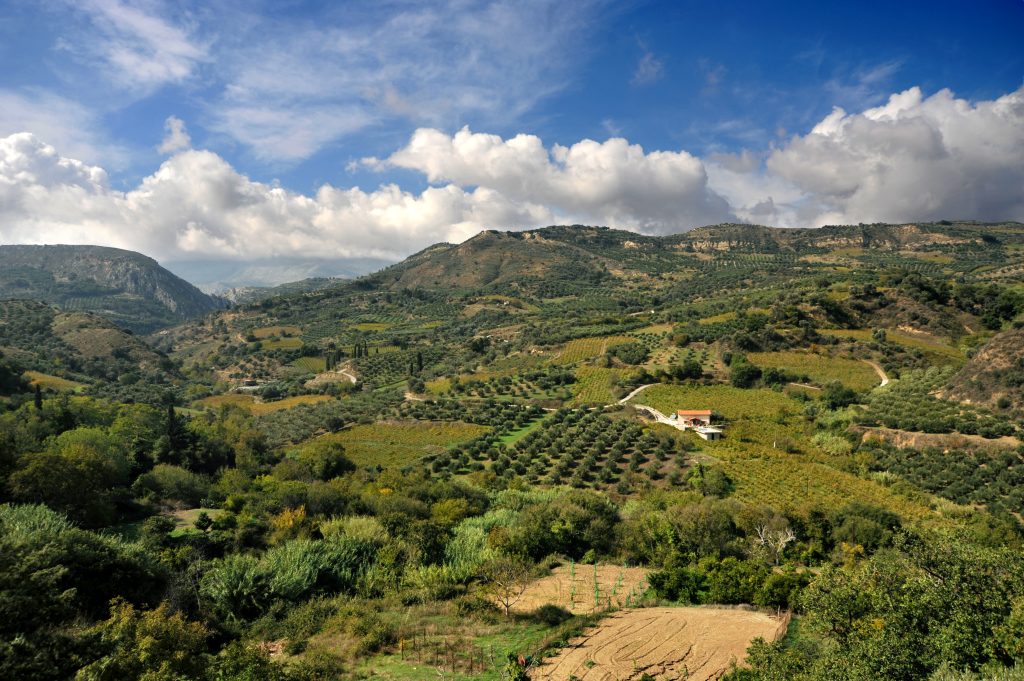
*By Dimitris Kyriazis
After a cosmopolitan life, Philippos Papadimitriou decided to settle in Agrilitsa, Argolida, and set up the initiative “Reconstruction of the Valleys of Western Argolida”, which tries to address the depopulation of the villages in the region. He clearly believes that our future is decentralization.
Philippos Papadimitriou was born a cosmopolitan, but he consciously decided to acquire his own place and become a farmer in Agrilitsa, Argolida. As he tells us, he feels that life in the village came naturally to him, as for years he had been trying to escape every city he lived in.
He believes deeply in decentralization and for this reason he decided to set up the NGO “The Smile of the Village”. Through this, he is leading the “Reconstruction of the Valleys of Western Argolida”, an initiative, in collaboration with local bodies and the municipality of Argos-Mycenae, for the repopulation and development of the Valleys of Western Argolida, with the aim of addressing the economic and demographic collapse of the region, which is rapidly leading to depopulation. The conversation with him follows.
“I was born in Athens in May 2002. My parents worked in the Economic and Commercial Affairs department of the Ministry of Foreign Affairs, and so a few months later we moved first to Israel and then to Brussels and Beijing. In early 2010, my parents sent me back to Athens to be taken care of by my mother’s parents in her hometown, in Nea Filadelfia.
“It’s good to be cosmopolitan, to get to know different cities and countries around the world, but I think it’s infinitely better to have your own homeland, your own place, with your own trees and your own stones.”
A few months later, my mother came too. I stayed in Athens until 2017. I remember a dirty, ugly, degraded city, with human misery prevailing everywhere, with the rawest emotions dominating. I went to the Greek-French School in Agia Paraskevi and had a middle-class life with travel and no deprivation. A comfortable life, but incredibly meaningless and boring.
In 2017, my mother was assigned to Toronto, Canada, and I followed her. In early 2020, with the pandemic just around the corner, we decided overnight to take the first plane to Greece, believing that a quarantine would be declared and that it would be better to spend it in our own country. And so it was. The only house available at the time was our house in the village, in Agrilitsa, so we were forced to go there. I have not left since.
This house came from my mother’s romantic desire to have our own “place” as a family. We are big city people and we never had a connection to any place, not even Athens. It is good to be cosmopolitan, to get to know different cities and countries around the world, but I think it is infinitely better to have your own homeland, your own place, with your own trees and your own stones. Both of my parents were mainly from Asia Minor, but Asia Minor for us is now nothing more than a faded memory.
After two years of constant searching, I found our farm in Agrilitsa through an ad on the internet. This farm has 800 olive trees on 50 acres and a stone house with various outbuildings. Geographically, it is located in a settlement of Agrilitsa, Agia Marina, on the rocky slopes of Mount Artemisio, in a verdant but rocky environment consisting of holly trees, olive trees and pastures and with a stunning view of the Xerias basin to the South.
I decided that I wanted to live in the village and not return to Athens and engage in some urban profession – although I later discovered that you can practice urban professions while living in a village. Until I decided this, my goal was to study Architecture – I had passed the Architecture School of Patras – and become an architect.
I grew up with the stereotypes that every Athenian learns about villages, that they are dirty, dangerous and inhabited by goblins. I had to live in the village to change my mind and see that ultimately the villages offer a very nice quality of life with few disadvantages, which is certainly superior to life in any Greek city. The village for me contains what I love most in this world: unadulterated nature, traditional architecture, gastronomy, tranquility and the age-old sense of tradition. It was therefore natural to finally live in the village, since all my life I had been looking to escape every city I lived in.
So, after I decided to live in the village, I decided to become a farmer because we had enough olive trees – and now we have many more – and it seemed logical. Also, the fact that I am a farmer does not prevent me from working professionally in other areas.
As you can see, I am not the typical farmer. I almost always wake up late, go to bed late and have no schedule. There is not much work in the olive grove, so I am not involved with the olives most days. But on the days that I am involved in the olive grove, I have to wake up early and work all day, from dawn to sunset. There is no time for lunch, not even for a snack. Surprisingly, when you are at work, you do not feel tired, and then it is a different experience to work and see the mountains and hear the birds chirping.
When I’m not working on olives, I’m working on animals, gardening, olive oil standardization, marketing, etc. In my free time, I study law, which I’m currently studying as a hobby, and I generally study everything from history to sociology and biology.
I honestly think that Agrilitsa probably offers one of the best life experiences anyone can find on this planet. The climate is hot in the summer but pleasant the rest of the year and, above all, dry. In the winter, we have quite a bit of cold, which I personally enjoy, we used to have snow. Our water comes from the mountain and we have absolute peace. Agrilitsa is a sparsely built village, consisting of various settlements, so the houses have space and in general the village breathes. And if you get bored, there are other beautiful nearby villages with nice places.
The village has no services other than the primary school, unfortunately. However, it is only 15 minutes from Argos and 30 minutes from Nafplio and has easy access to the highway, so practically any need can be easily met.
My own view of culture is quite different, so I didn’t really lose anything by staying here. For me, culture is what is real and honest.
It’s the olive picking in October, it’s the stone craftsman, it’s the amateur street painter and respect for nature. You’ll find little shops and cafes everywhere in the world, but you won’t find a good life everywhere. The countryside isn’t perfect, but I think it still has a humanity and a symbiosis with nature that cities don’t have. However, there is also a luxury in village life, if that’s what someone is looking for.
There are 24 Koiladochoria in total and they belong to 8 individual “counties”, or valleys, in the mountainous and semi-mountainous areas of Argos. The connecting element of these villages is that they are located in valleys and there is this interaction between the steep mountains and the usually tame lands that spread around rivers. The villages are stone-built – although in Malandreni we also have mud-brick – and they mainly date back to the late Middle Ages and the Ottoman period.
We were motivated to act because this area, to which my village, Agrilitsa, belongs, has been experiencing absolute demographic, economic and social collapse in recent decades and is facing desertification within a decade. We believe that our countryside has two choices: either it will be repopulated by new people and will develop, or it will decline, die and disappear, as so many places in our country have disappeared. The second choice is tantamount to suicide and I do not believe in suicide, so we decided to act.
The first action of NGO is first of all the creation of a network of collaborations with local bodies, such as cultural associations, wineries, olive producers, tourist agencies and in general anyone who has a connection with the region and is interested in highlighting it in terms of tourism, nutrition and culture.
Another action that we have started recently is the organization of open and free events to introduce the general public to the people, products and sights of our region. Today, May 3, we have an event of our own, where we will get to know the Colorful Plateau of Alea, the Frusiouna River and the historic main village of Bougiatio (Alea) with its rich traditional architecture and history.
Furthermore, we are trying to promote the Koiladochoria on the internet, mainly through Instagram, and we seek to build partnerships with journalists and influencers to achieve this goal. Although it is a beautiful area full of attractions, so far no one has seriously taken the initiative to promote it and bring people to it, and that is truly a sin.
Our actions are mainly intangible because we believe that the most important thing for developing a region is collaboration, vision and the creation of a place identity. So, a primary element in everything we do is the place identity, to create a unified, modern but also traditional identity that will express our villages, mountains and rivers.
In the future, we also intend to carry out material actions, such as marking hiking and cycling routes, developing handicrafts, creating climbing routes, placing information signs and highlighting architectural monuments. Also, why not build a co-working center? There are infinite ideas but not infinite funds, and above all not infinite people to help us.
I believe that all places have a future, as long as there are people to love them, to hurt them and to fight hard for them without fear and hesitation. Koiladochoria has been a place without a future, without identity and without love for a long time, but I want to believe that things have begun to change, albeit slowly. I think we are on the verge of a great revolution in our villages.
I would like to see our large villages become real capitals, with shops, cultural infrastructure, factories, quality tourism and dynamism. Ideally, small villages would become centers of ecological, rural and medical tourism, arks of authenticity, and produce the highest quality agricultural products on the planet. Our villages could be places of hope and future, not misery and abandonment.
What I would also like to see are revival groups in every valley of the country, because this is what our countryside deserves and nothing less. Every village is a new beginning, a hope for a better life.
Decentralization is the future and I believe that there is a law that is pushing us all back to the village. The dream of urban restoration has collapsed, so let’s move on to a new model for ourselves and for our children. We, as Smile of the Village, are ready to help anyone who wants to take this important step and we invite them to contact us, even if they are not interested in our region. However, if they come to us, they will not regret it.
Source: lifo.gr




